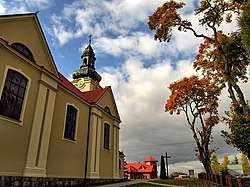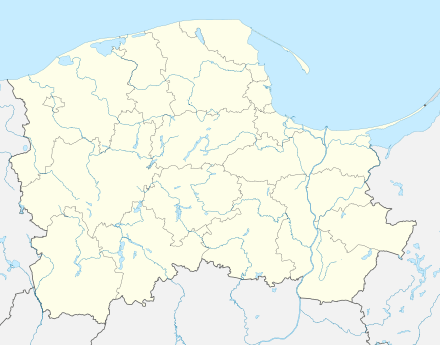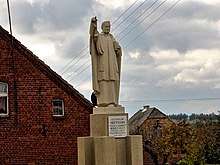Pinczyn
Pinczyn [ˈpint͡ʂɨn] (German: Pinschin) is a village in the administrative district of Gmina Zblewo, within Starogard County, Pomeranian Voivodeship, in northern Poland.[1] It lies approximately 4 kilometres (2 mi) north of Zblewo, 13 km (8 mi) west of Starogard Gdański, and 49 km (30 mi) south-west of the regional capital Gdańsk. It is located within the ethnocultural region of Kociewie in the historic region of Pomerania.
Pinczyn | |
|---|---|
Village | |
 Saint Elisabeth church in Pinczyn | |
 Pinczyn  Pinczyn | |
| Coordinates: 53°57′44″N 18°20′47″E | |
| Country | |
| Voivodeship | Pomeranian |
| County | Starogard |
| Gmina | Zblewo |
| Highest elevation | 142 m (466 ft) |
| Lowest elevation | 102 m (335 ft) |
| Population | 2,325 |
| Time zone | UTC+1 (CET) |
| • Summer (DST) | UTC+2 (CEST) |
The village has a population of 2,325.
History
Pinczyn was a royal village of the Polish Crown, administratively located in the Tczew County in the Pomeranian Voivodeship.[2]

During the German occupation of Poland (World War II), local Poles were subjected to various crimes. The local parish priest Stanisław Hoffman was arrested on October 13, 1939, imprisoned and tortured in Starogard Gdański, and murdered in the Szpęgawski Forest along with other Polish priests on October 16.[3] Local Polish teachers were murdered in the Szpęgawski Forest on October 20, 1939, and several Poles from Pinczyn were in 1939 also murdered in the Zajączek forest nearby (see Intelligenzaktion).[4] In 1942, several Polish families were expelled from the village to Potulice and afterwards deported either to the General Government or to forced labour, while their farms were handed over to German colonists as part of the Lebensraum policy.[5]
References
- "Central Statistical Office (GUS) - TERYT (National Register of Territorial Land Apportionment Journal)" (in Polish). 2008-06-01.
- Marian Biskup, Andrzej Tomczak, Mapy województwa pomorskiego w drugiej połowie XVI w., Toruń, 1955, p. 112 (in Polish)
- "Stanisław Hoffman" (in Polish). Retrieved 9 August 2020.
- Maria Wardzyńska, Był rok 1939. Operacja niemieckiej policji bezpieczeństwa w Polsce. Intelligenzaktion, IPN, Warszawa, 2009, p. 148-149, 153-154 (in Polish)
- Maria Wardzyńska, Wysiedlenia ludności polskiej z okupowanych ziem polskich włączonych do III Rzeszy w latach 1939-1945, IPN, Warszawa, 2017, p. 120 (in Polish)